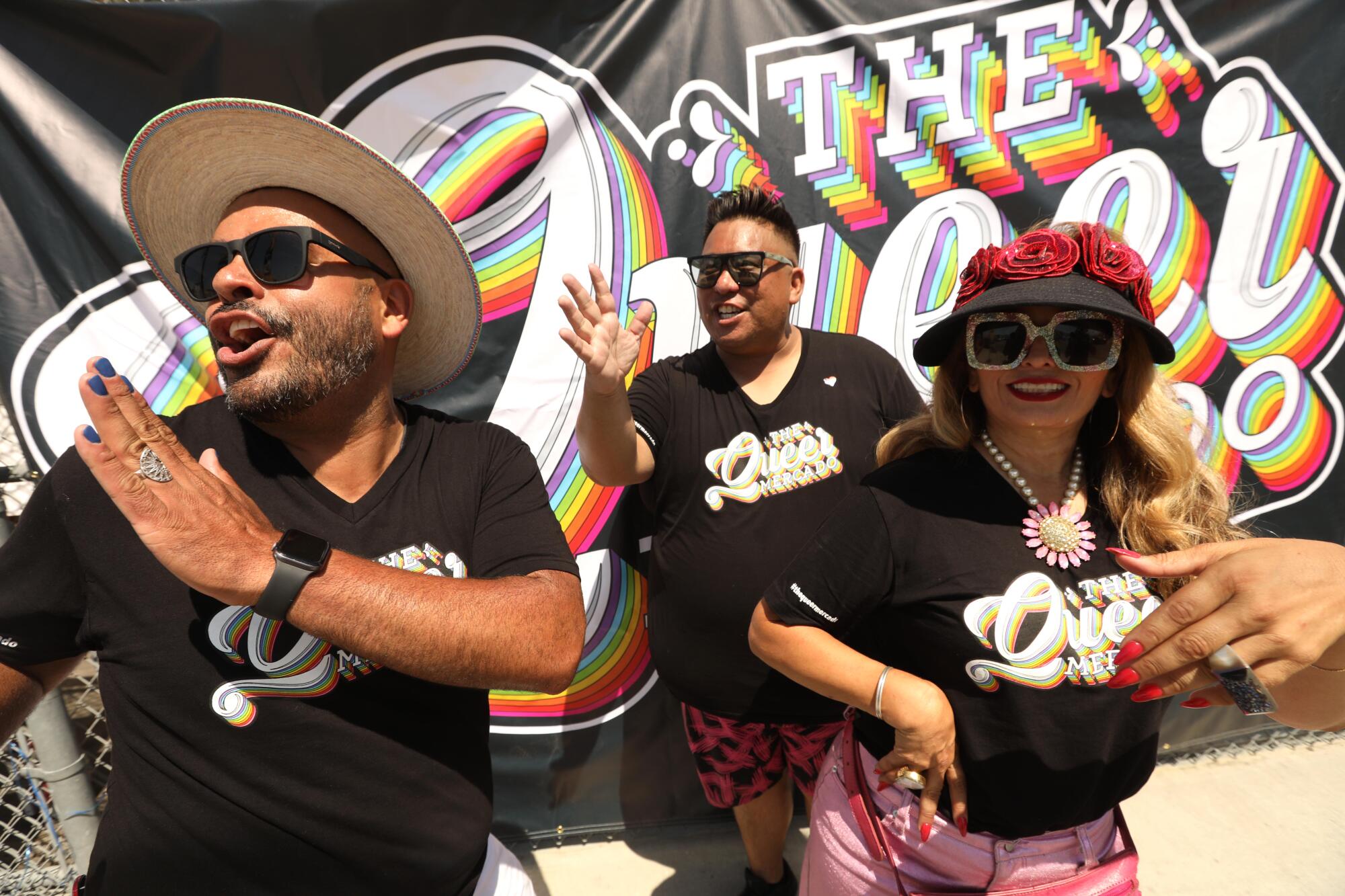
- Share via
Diana Diaz grew up making pillows and blankets to sell with her family at swap meets. On the weekends, she’d see those same vendors at family parties. Some of the kids became dates to weddings and high school prom.
Her own family paid off their house and cars through selling at swap meets. She lived for those intimate interactions and wanted to re-create them.
“We became family,” said Diaz, 49. “We became a community.”
Diaz wanted a space that would help LGBTQ Latinas and Latinos find footing in their communities — someplace that would make them more visible and, perhaps, offset the ongoing gentrification in East L.A.
Although there are LGBTQ bars, restaurants and clubs scattered across Los Angeles, they are few and far between east of downtown.
“That’s power,” Diaz said. “By being more visible, we increase tolerance and eventually gain more acceptance.”
The Queer Mercado, held the third Saturday of each month, draws merchants who pitch their tents across the parking lot of the Hilda L. Solis Learning Academy.
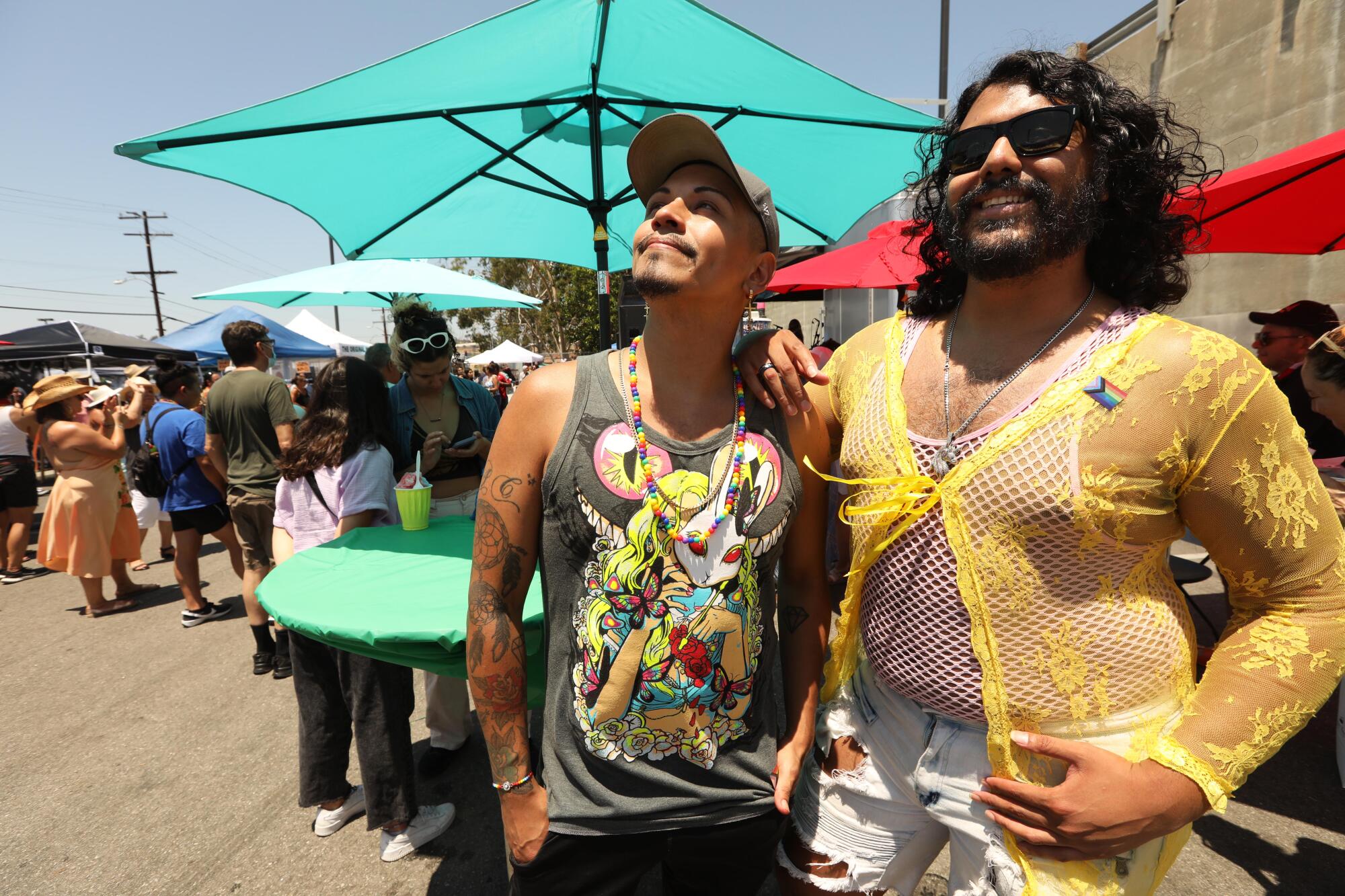
On a recent July morning, 15 minutes before the gates opened, Ryan Montez, 43, was still staring at the vendor map — pieces of a puzzle he’d been putting together for weeks.
The Queer Mercado would be celebrating its one-year anniversary. Everything needed to be perfect.
“So many moving pieces,” said Montez, another founding member who serves as the mercado’s social media coordinator. “That’s what makes it fun.”
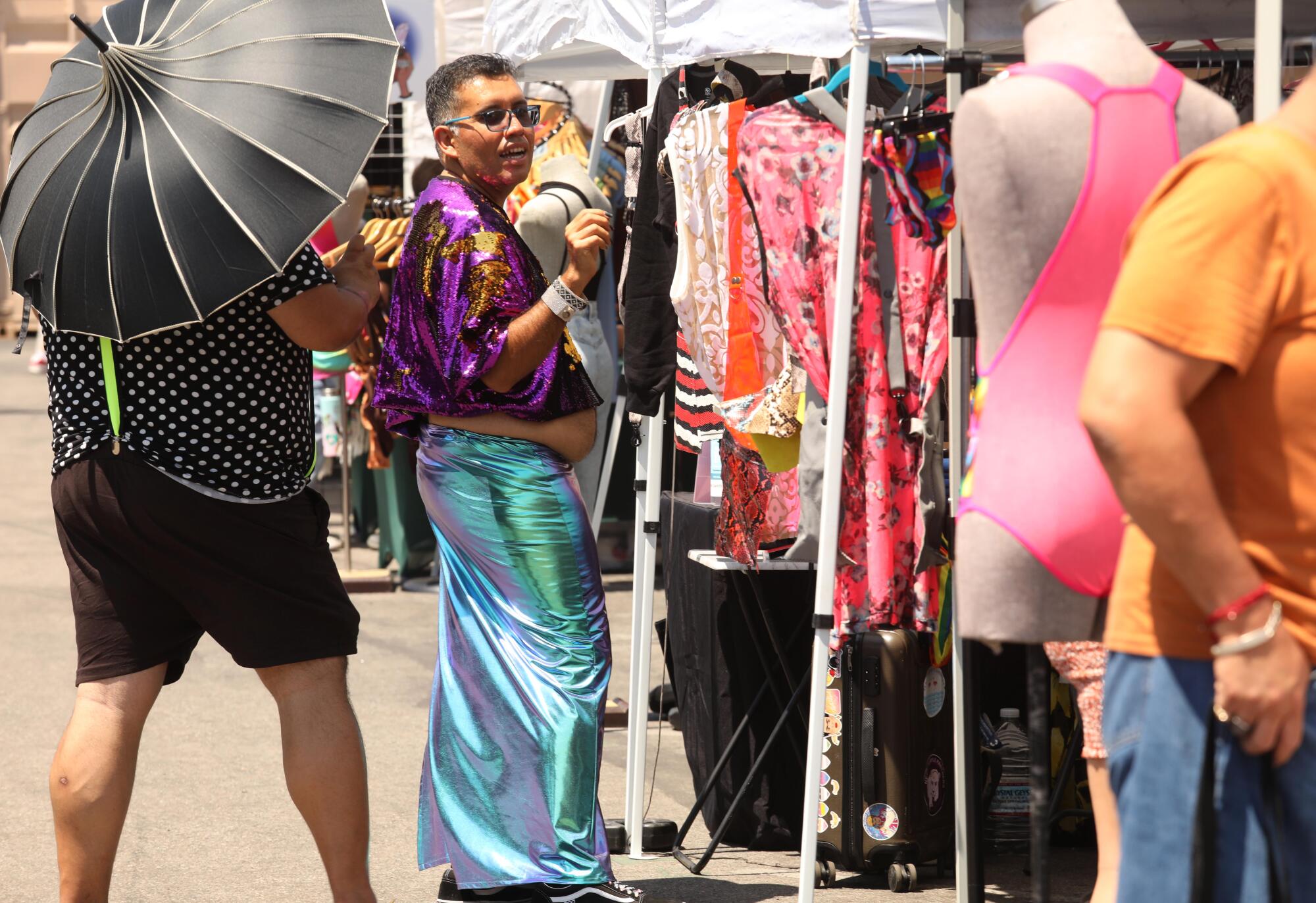
In creating the event, Diaz originally thought of naming it “the Chicano Queer Mercado,” but dropped the first part to be inclusive of other Latino identities.
“We became family. We became a community where we would help each other and tell each other about resources.”
— Diana Diaz, Mercado’s founder and vendor curator
Since July 2021, the mercado has grown from 42 to more than 130 vendors. Proceeds from vendor fees, as well as donations, go to supporting the event and the adjacent Hilda Solis academy.
But amid that boom, Diaz hasn’t let go of her knack for selling products and forming connections. Her tent lies at the Queer Mercado’s entrance, stuffed with colorful leather handbags, wallets and fanny packs that are part of her brand, Mexichic.
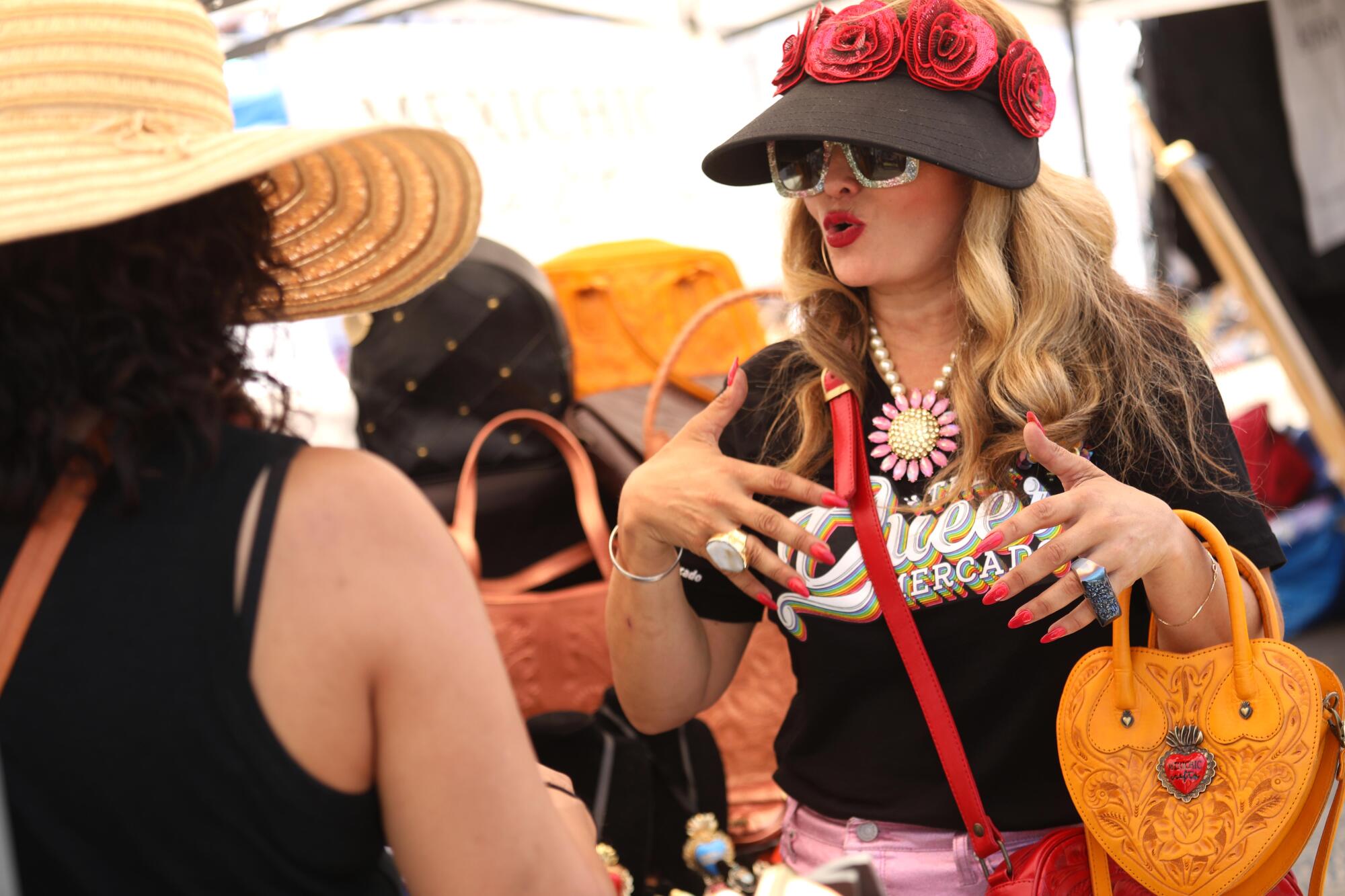
Staying in touch with her culture has helped her build confidence, she said.
As patrons began streaming in that Saturday, Gaudencio Marquez — a queer crocheter who also helped Diaz launch the Queer Mercado — worked alongside maintenance staff to sort through bags of tamales and prop up the market’s banner, which displays Marquez grinning, while wrapped in a brightly colored Mexican serape.
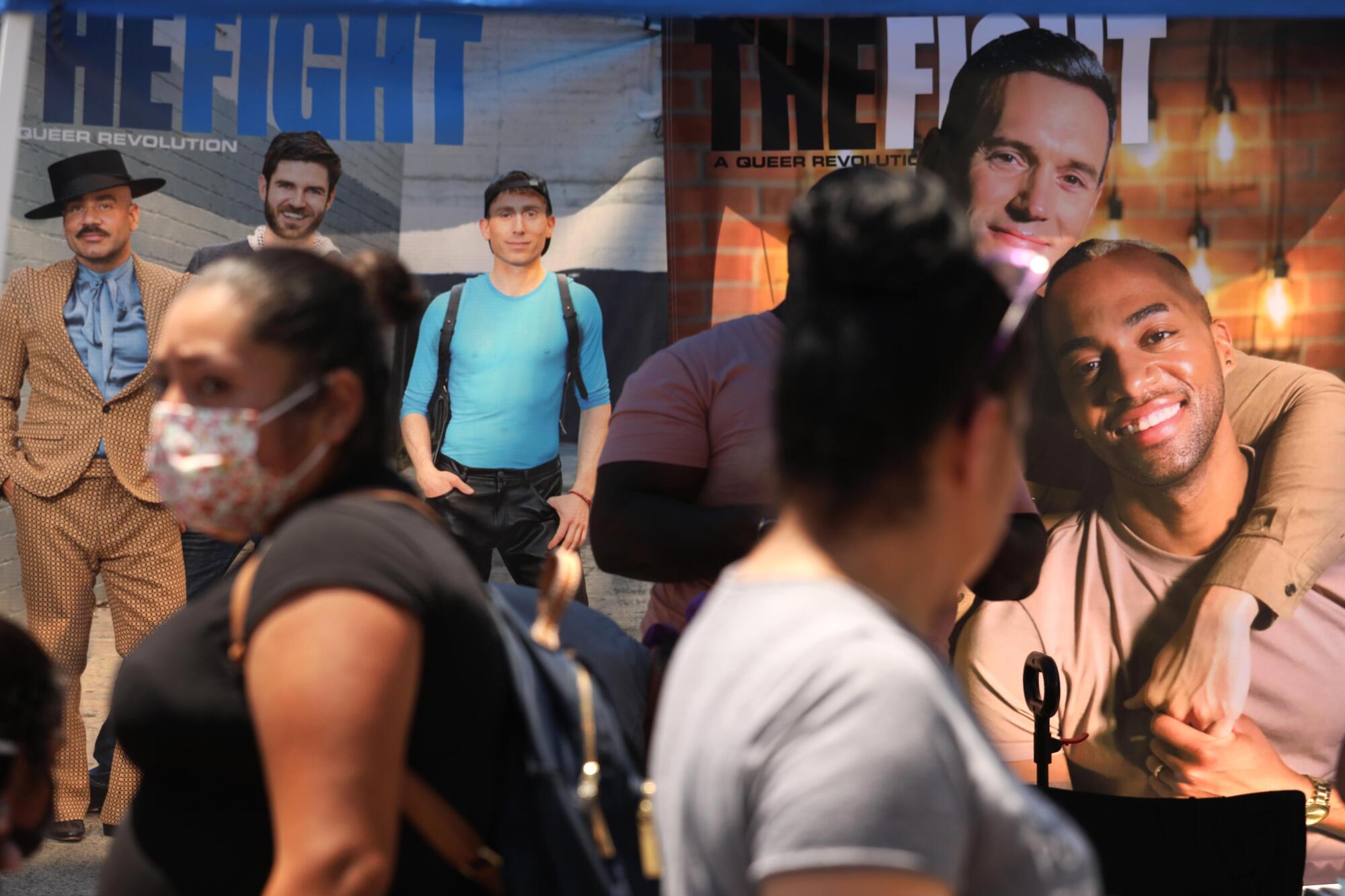
He was selling three kinds of tamales: cheese, rajas and puerco.
“This is my family reunion,” he said.
Nearby Diaz, adorned in a metallic pink miniskirt and a black visor with bright, beaded roses woven across the brim, greeted the arriving vendors.
“Hola, amor. Hi, cousin. ¿Cómo esta todo?” she yelled out to a Honda Civic passing through the gate.
Vendors scattered to their booths. The festivities were set to go on for about nine hours.
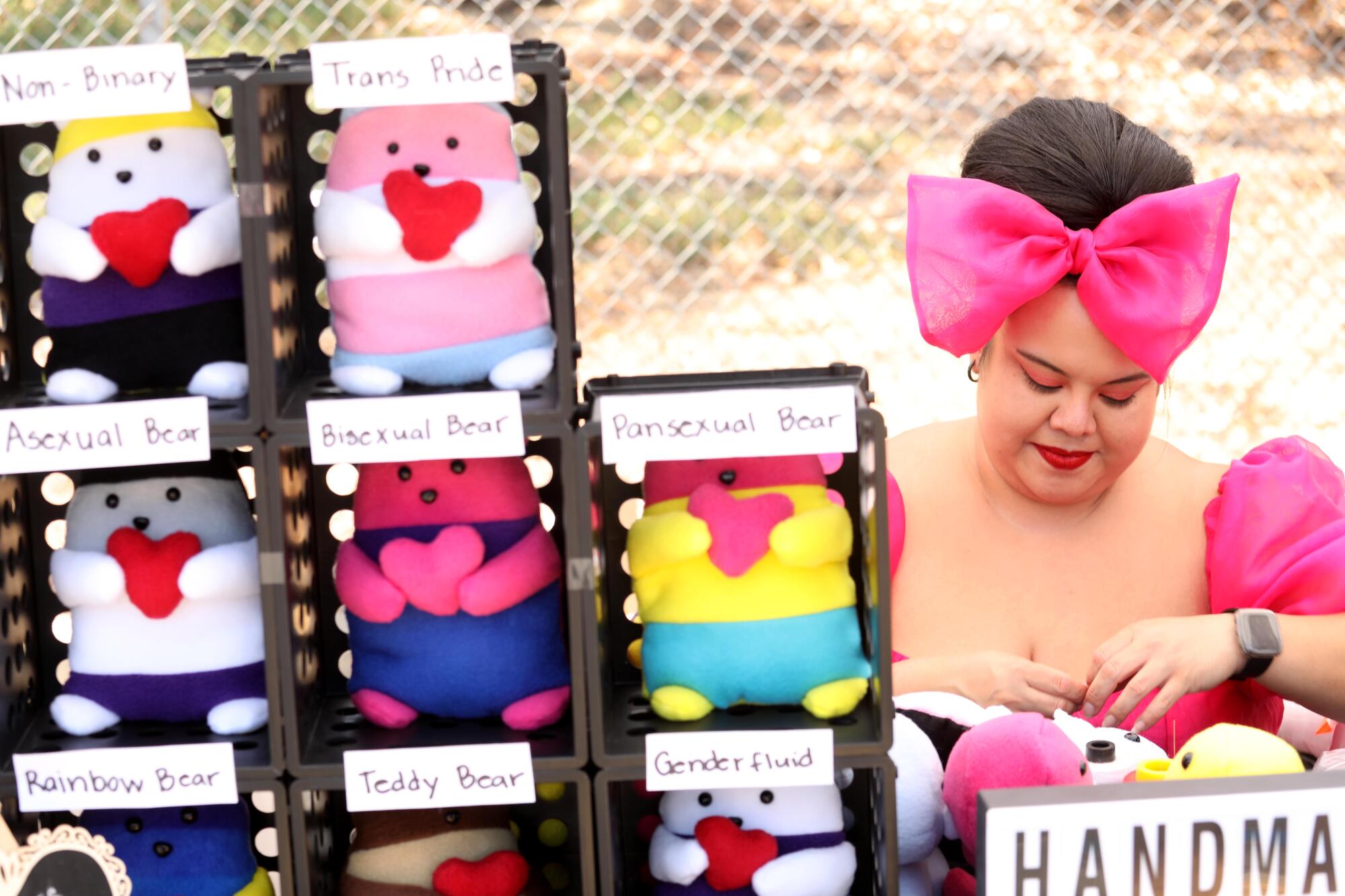
Presley Amado Muñoz, 47, knew exactly where he wanted his tent to be situated: at the far right corner, close to the stage, a hot spot for vendors, performers and customers to spill out the latest chisme, or gossip.
As the energy that is the Queer Mercado was picking up, vendor Jose Huizar, 36, the owner of a men’s swimwear brand called the Bad Burro by Huizar, bolted into Muñoz’s tent with big news: Mexican singer Paulina Rubio had replied to Huizar’s Instagram tribute to her during the Long Beach Pride Parade the week before, with a heart-and-hands-praying emoji.
The designer had spent weeks putting together a two-piece, gold-fringe suit that resembled the blonde, curly locks Rubio is known for. Over the years, Huizar turned to Rubio’s music when he was struggling with his identity as queer and Latino.
“I needed her to see how much she meant to me,” he said.
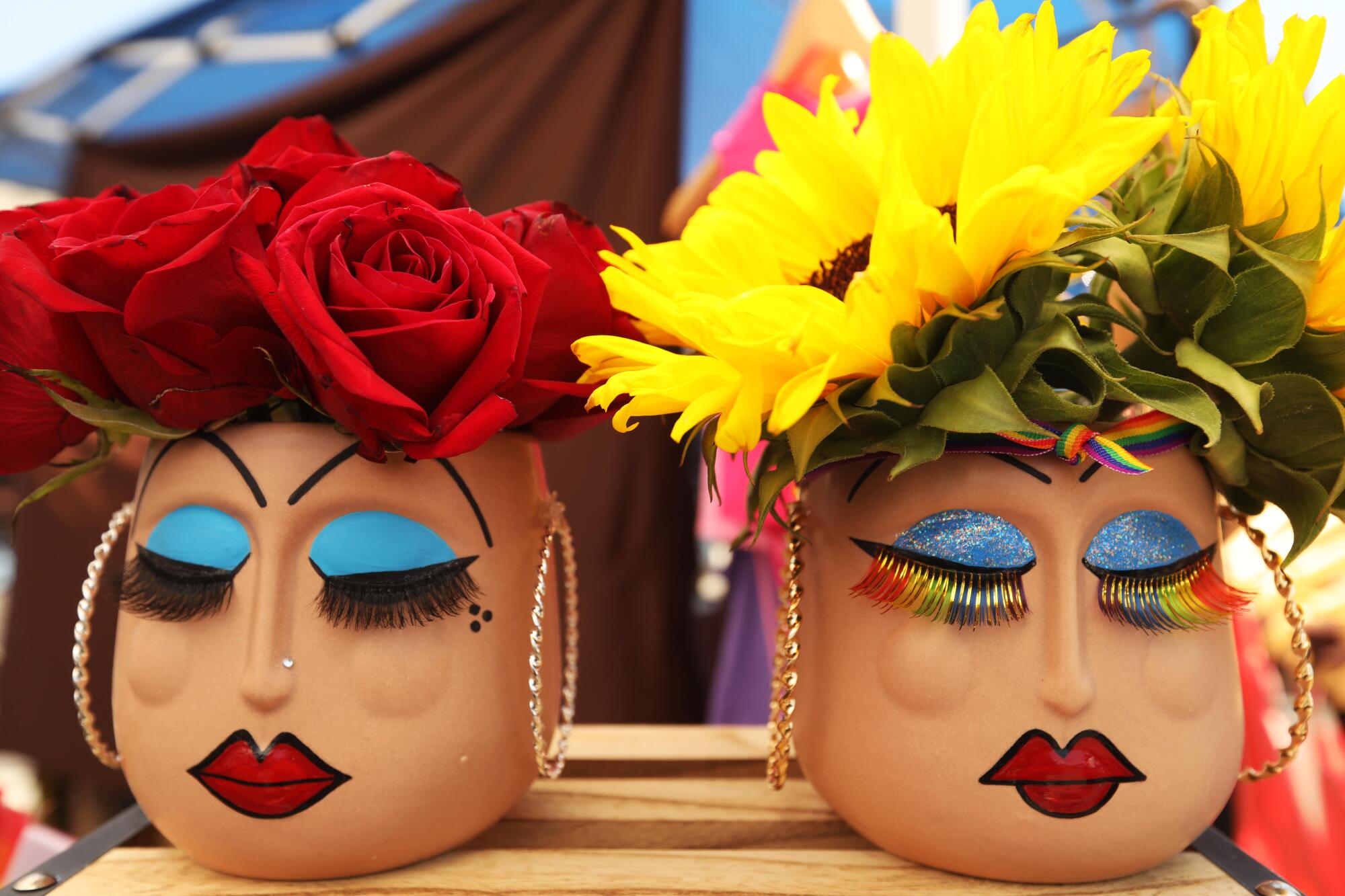
Muñoz soaked up the conversation while taking inventory of his bamboo earrings — designed with the words “Chingona” and “Queer” across the gold hoops.
It was the sense of community that made him feel so at home at the Queer Mercado, he said. “I’ve been very blessed to have wonderful neighbors, who I feel are, like, my queer family.”
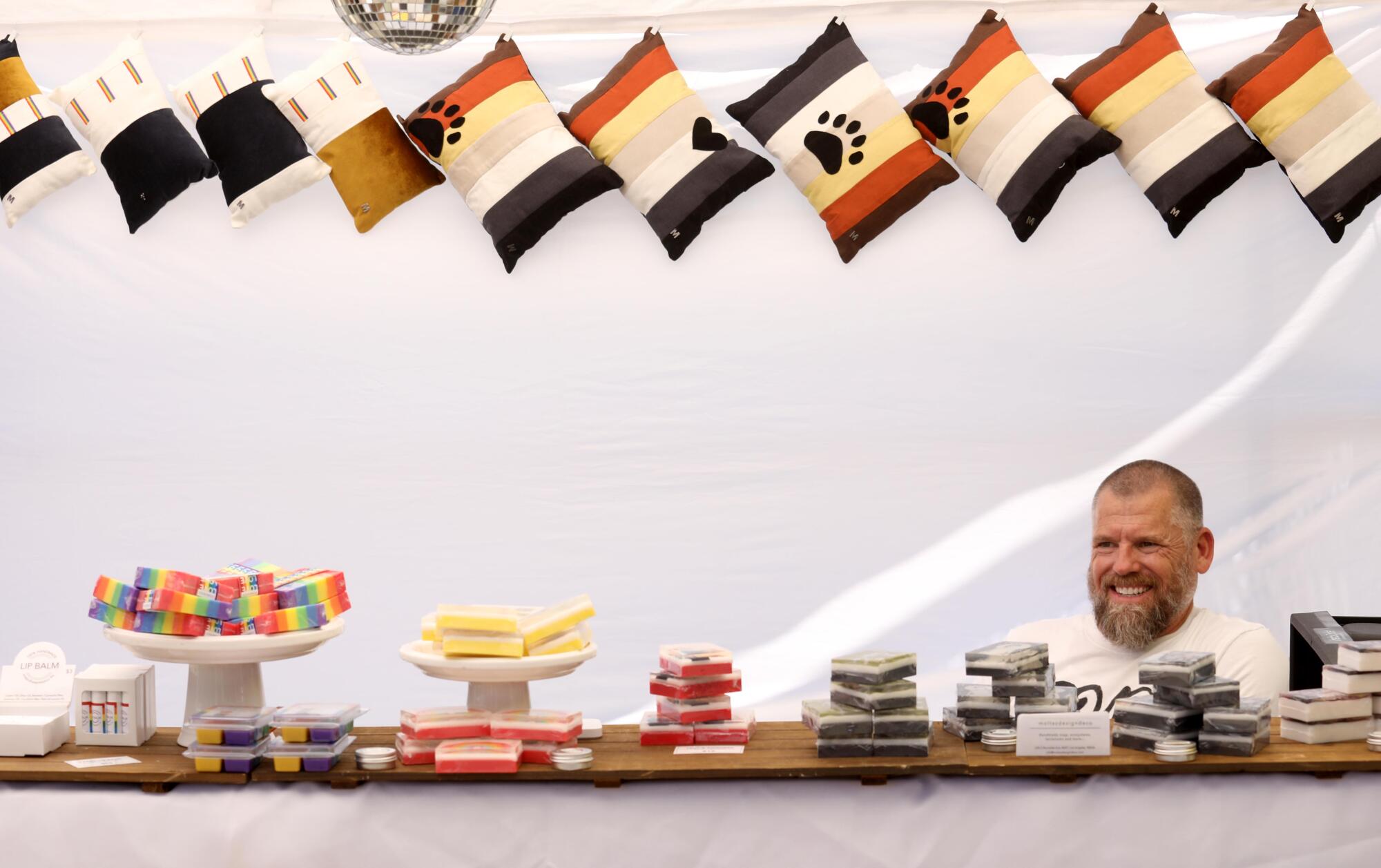
Being the only transgender person among Chicano family members, Muñoz is no stranger to feelings of isolation. It took him longer to come to terms with his identity because he didn’t have as many role models to look up to, he said.
He felt uncomfortable establishing his own masculinity in a Latino-dominated culture that came with a strict social and dress code — one where not showing emotion was expected, as was being aggressive and wearing cologne and studs.
His brand, Ethical Punk, which he launched last year after tiring of working in corporate sales, comes from building that confidence.
“I found my masculinity the first time I put my biggest hoops on,” he said.
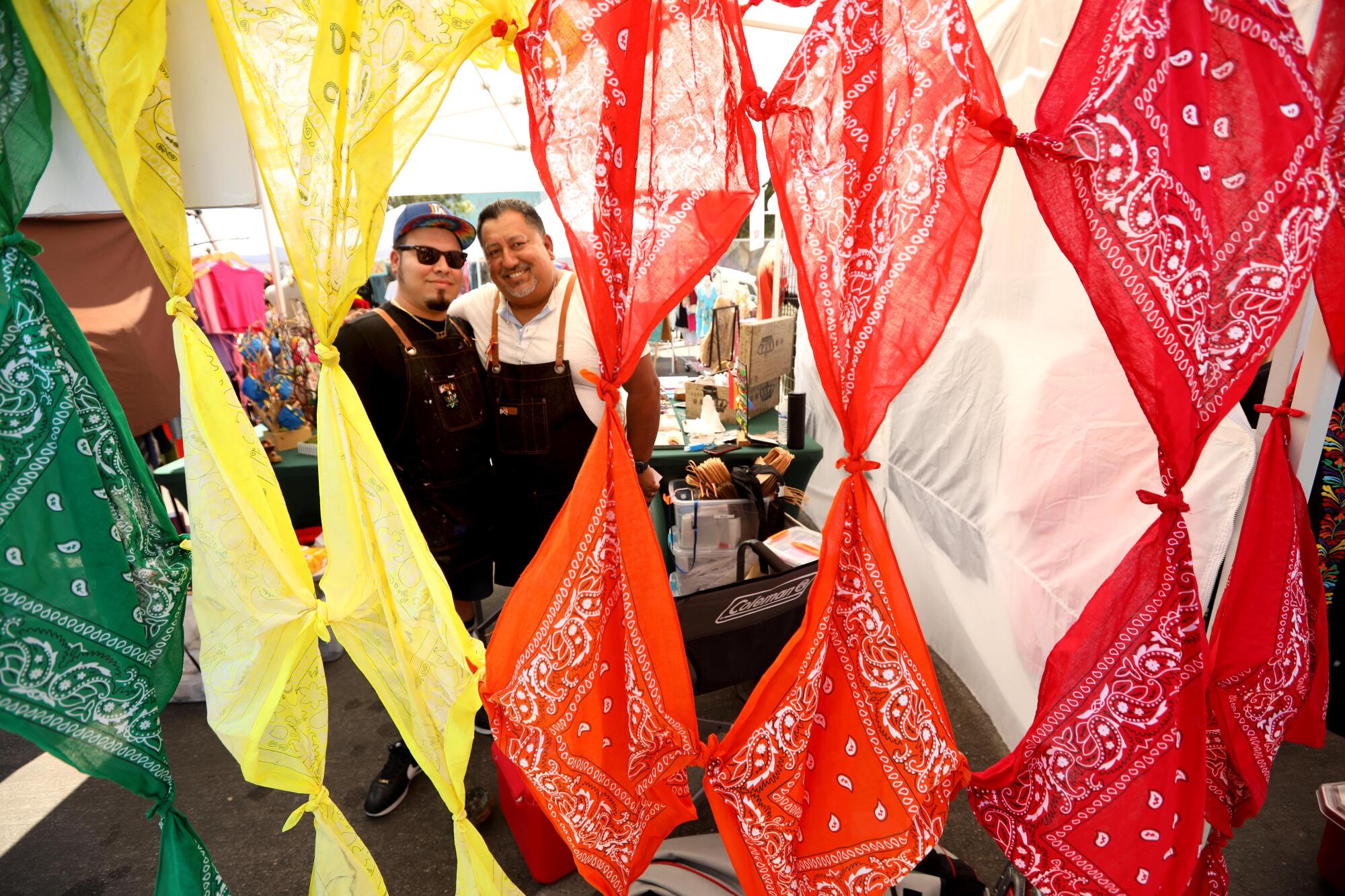
The brand, to him, is similar to that of a rose: beautiful to gaze at, but it will prick anyone who disrespects what Ethical Punk stands for.
“I want to bloom, and grow, and continue to do so,” Muñoz said. “I have my own sunlight. That’s really what it is — defying the odds and growing through an environment that was not soiled and not watered.”
Emily Finch, a counselor at Susan Miller Dorsey Senior High School, was introduced to the Queer Mercado through the Ethical Punk social media page. She’s attended five of the market’s events since then and purchased Christmas presents for loved ones from many of its vendors.
She said it feels like a theme park in a part of town that has historically been an unwelcoming space for queer Latinos.
“It’s a protected bubble of love,” Finch said. “You feel like you’re not in L.A. You’re transported somewhere else where people can be themselves freely — free of violence or judgment.”
Finch felt it when Muñoz brought his mother and other family members to an event. She was brought to tears talking to Finch, in awe of a community that welcomed her son with open arms.
“Not that many people would come out and celebrate my son, and celebrate my child,” she told Finch.
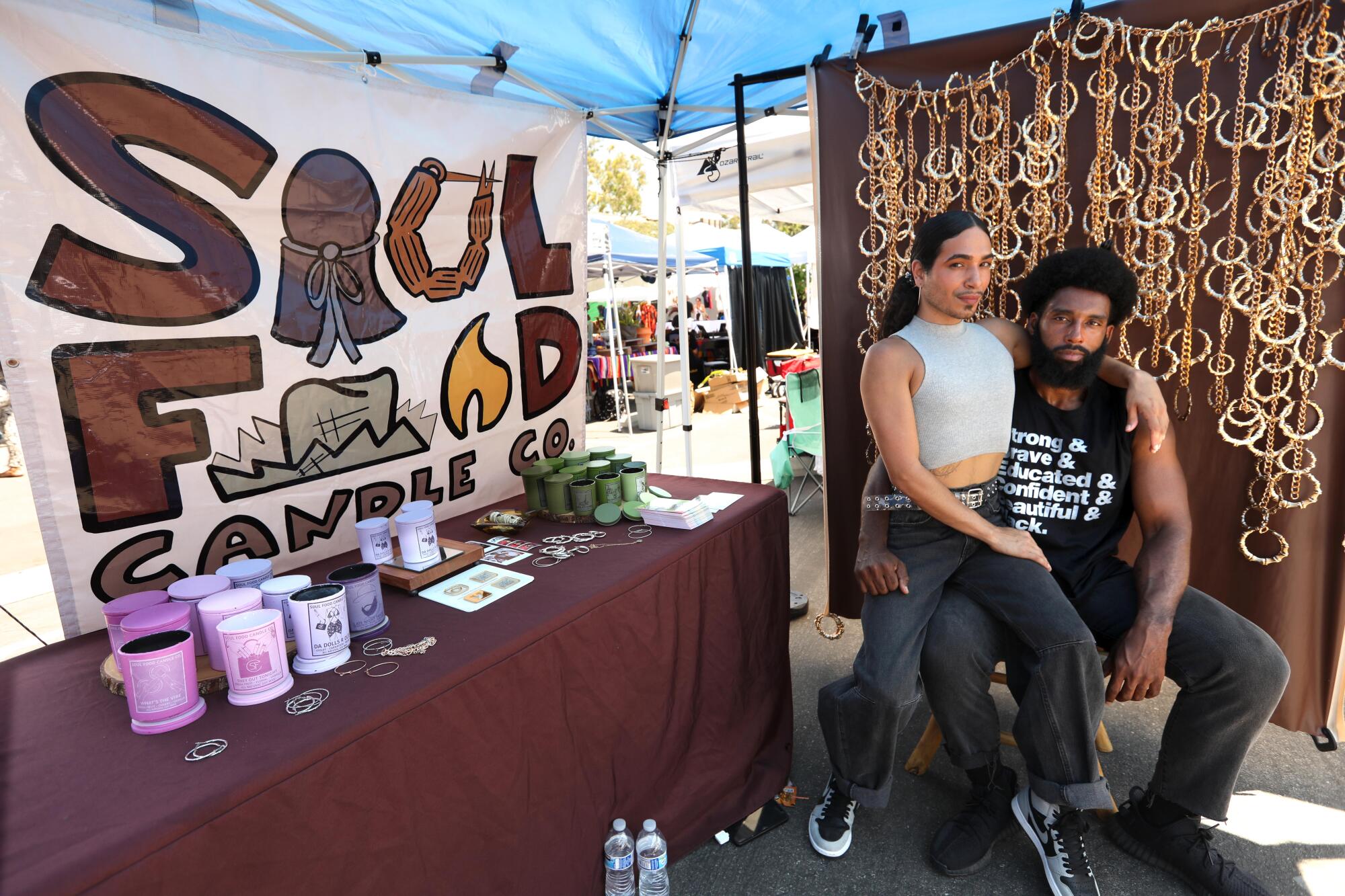
Running Soul Food Candle Co. as a duo allows Ko and DeMarkus Trinidad-Williams to drop by other vendors’ tents and catch up with some customers while tending to others.
Near the couple’s tent, DeMarkus browsed through a sea of ribbed gold hoops, turquoise beaded cuff bracelets and silver chandelier earrings.
“They’re $5 each,” said Diaz’s nephew, Seth, breaking DeMarkus’ intense stare.
Ko was selling candles and other items that reflect the complexities of the couple’s respective identities. Born and raised in Compton and the eldest of five children, Ko said, they always felt pressure to present as traditionally masculine. Not being able to grow their hair out. Receiving judgment if they decided to wear heels.
Meeting DeMarkus nine years ago, and eventually getting married, has helped them embrace the duality of their feminine and masculine sides.
Born in Boston and raised in Inglewood, DeMarkus, who is Puerto Rican, felt unrepresented and out of place amid L.A.’s Mexican and Central American queer culture. Their products, which come in a broad range of skin tones, aim to help Black and brown individuals reconnect and identify with their lives and experiences.
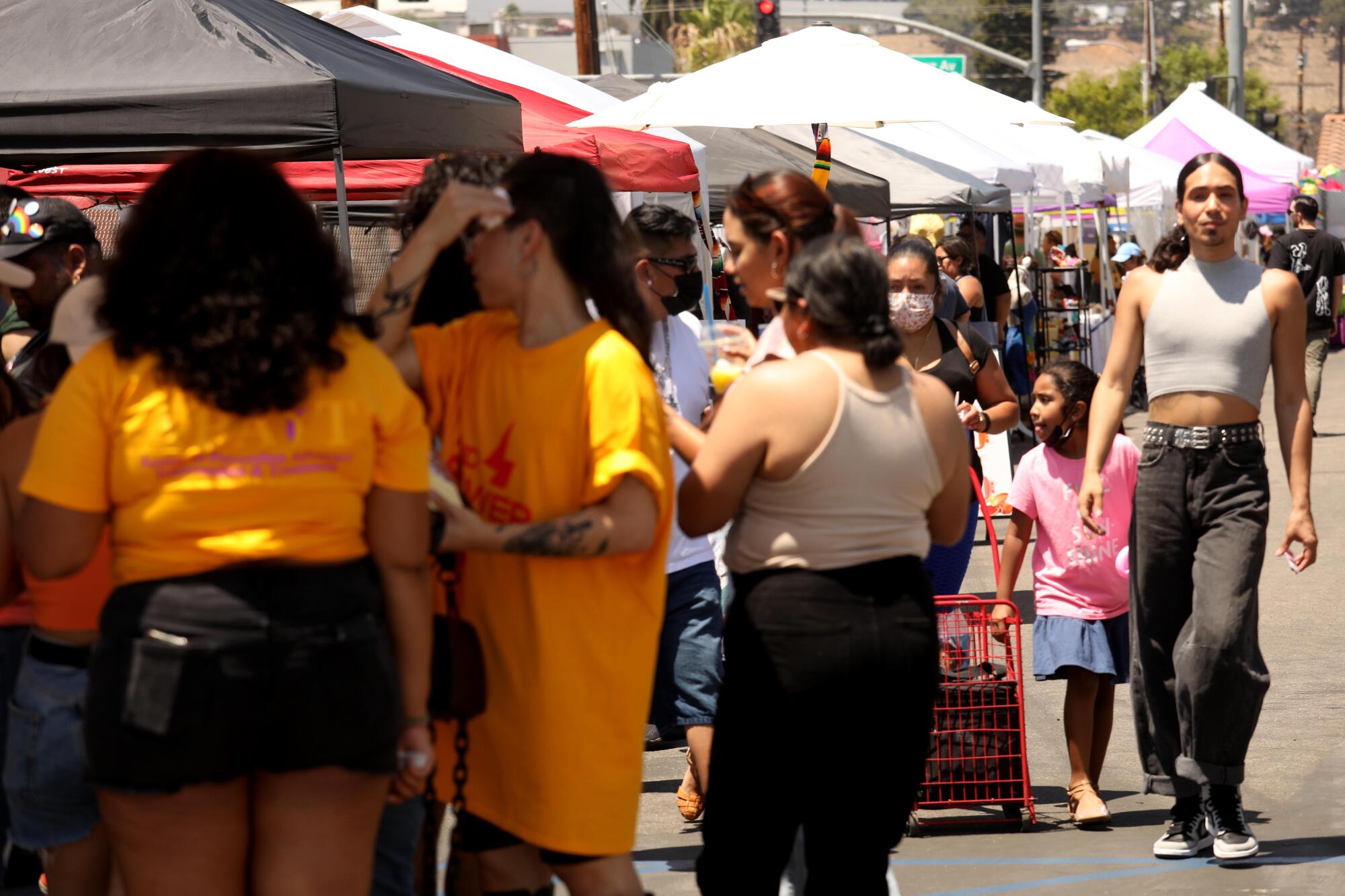
Their Sandlewood Silked Waves candle depicts a person wearing a durag on its label and is scented with vanilla, honeysuckle, bergamot and floral lavender. Their Shot of Coquito candle is based on a rum-and-coconut drink popular in the Caribbean.
“There can be so much trauma and pain for Black and brown folks,” DeMarkus said. “It’s important to these scents that can speak to you and touch your soul.”
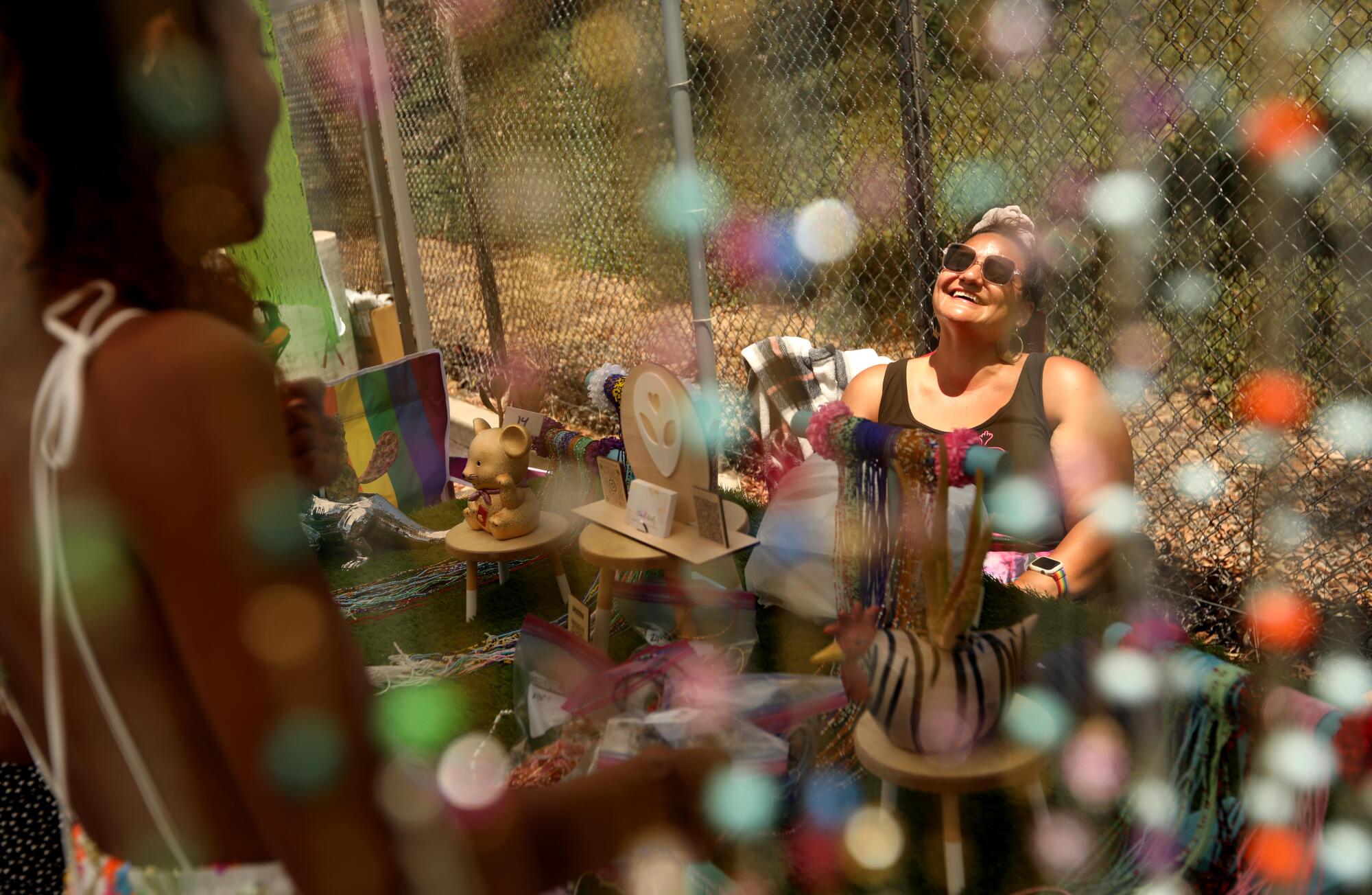
Although Yvonne and Marina Marquez understand and speak Spanish, it’s not perfect. They can carry on casual conversations, but it’s easy to get tripped up on certain words or dialects.
It’s the all-too-common limbo: not feeling Chicana enough, but also not feeling American enough.
“We’re no less Latino than anyone else,” Yvonne said.
That’s why they felt nervous their first time selling at the Queer Mercado.
They’ve come to learn that it’s OK to slip into Spanglish during conversations with attendees — it doesn’t take away from their identities.
“I’ve owned my pocha-ness, whereas before, I used to be embarrassed about it,” Yvonne said.
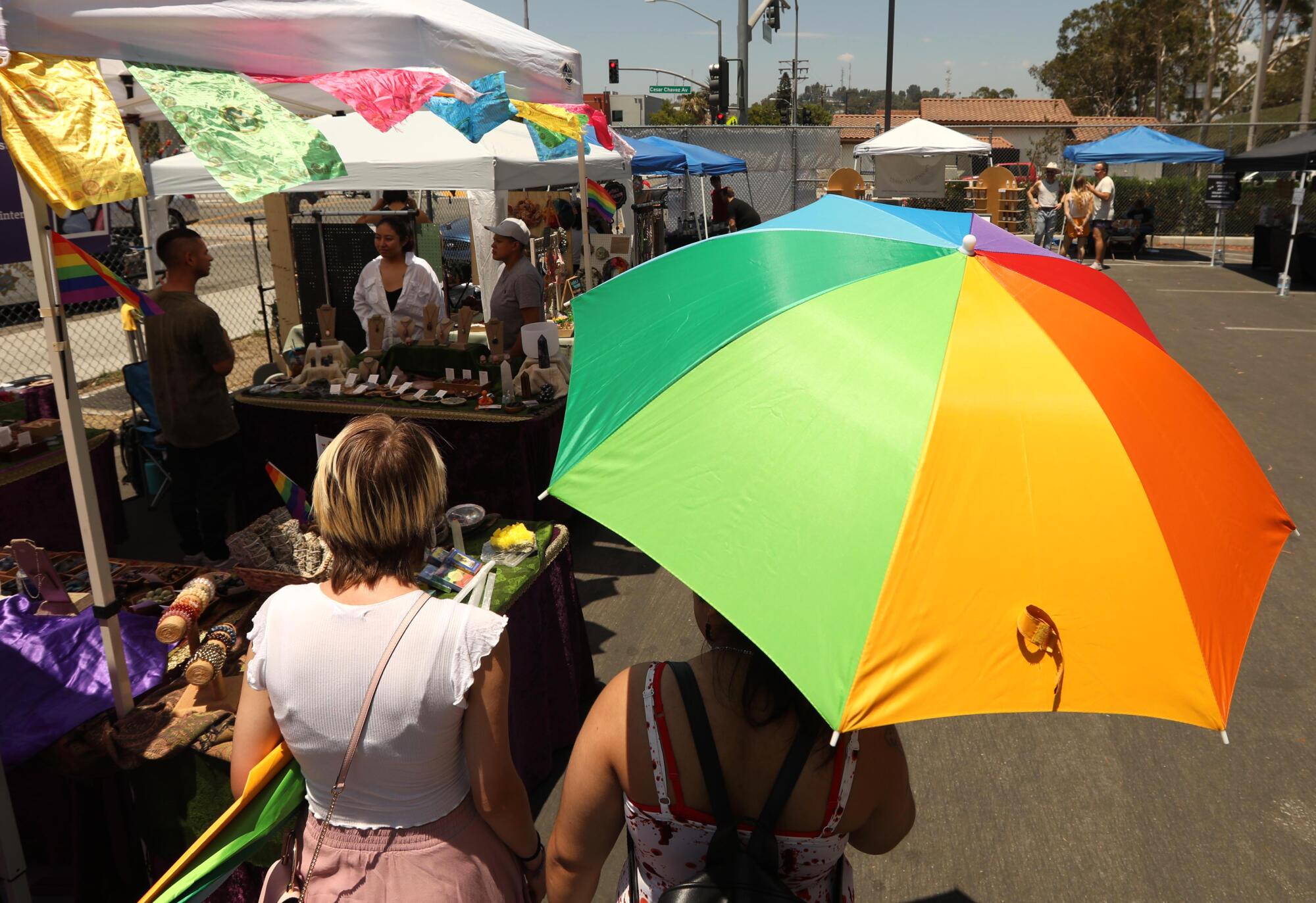
The couple, who met on Zoosk, an online dating app, have sold at and attended swap meets since they were children. Each event had its own ambience and culture, but they seldom saw Mexican women, let alone Chicana lesbians even in queer spaces.
Yvonne said that the Queer Mercado’s atmosphere has helped them feel more comfortable in themselves and with their brand, Adelitas’ Revenge. The brand is rooted in celebrating Mexican and Mexican American icons such as Frida Kahlo, María Félix and Selena through folk art, candles and bracelets.
They named the brand after Las Adelitas, a nickname given to the soldaderas who fought during Mexico’s Revolutionary War.
“We’ve always looked at Las Adelitas as heroines of ours,” Yvonne said. “We wanted to use revenge — not in a negative or derogatory way — but more as a positive, like, this is our turn now.”
Yvonne began designing and configuring Día de Muertos ofrendas when she needed a place to mourn after her nephew and best friend passed away in 1997.
The Queer Mercado gave them the confidence and motivation to open their own boutique in Belmont Heights in Long Beach.
That’s one of the goals Diaz had in mind when she founded the Queer Mercado: to help businesses build the muscle and strength to expand.
Although their store is closed two days a week, it’s become their second home — one they don’t have to unpack and dismember at the end of the afternoon.
During the most recent Queer Mercado, Yvonne and Maria took a break from selling and browsed through the other vendors’ tents, hands locked as they strolled.
Though busy with their own store, they can’t help but keep coming back to the mercado.
More to Read
Sign up for Essential California
The most important California stories and recommendations in your inbox every morning.
You may occasionally receive promotional content from the Los Angeles Times.














